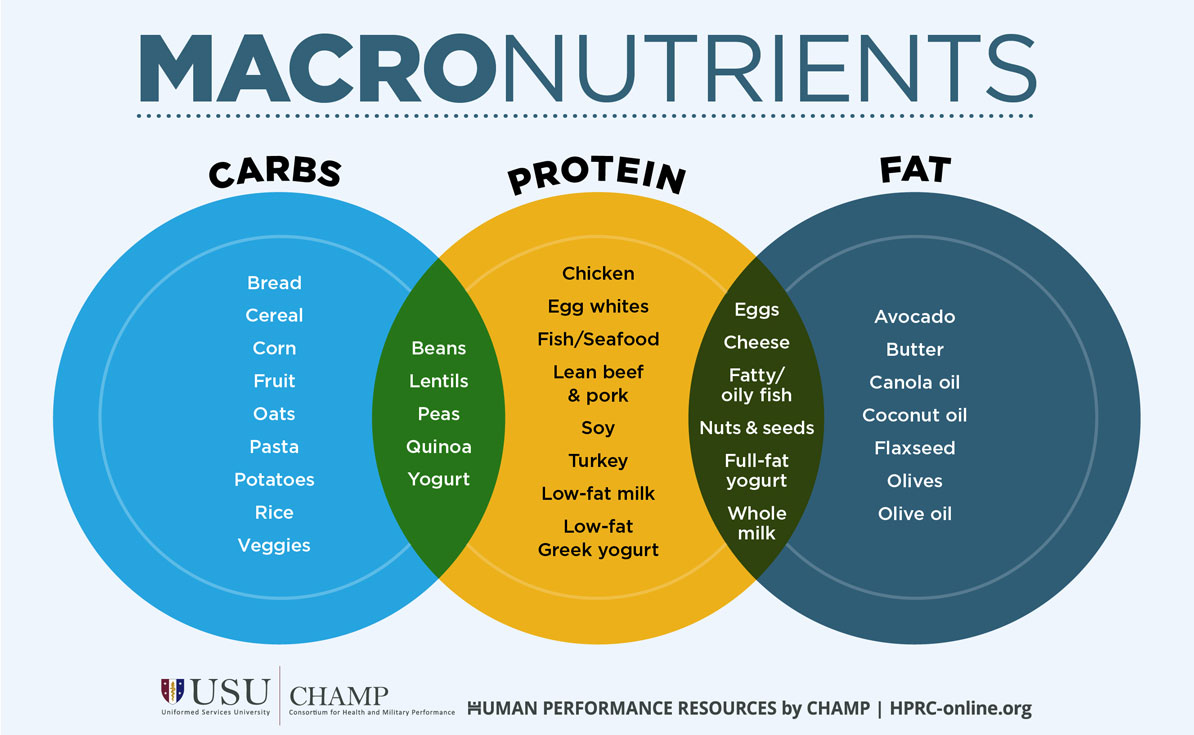Sports Nutrition 101
When talking about sports nutrition, its not so much about what you eat but rather when you eat. We call this nutrient timing. Even though your schedule may vary (workout could mean practice, conditioning, weightlifting, or a game) you should try to eat every two to three hours to keep your nutrient levels stable and muscles primed for competition.
A typically day should look something like this:
Breakfast - 7am
Snack - 10am
Lunch - 12pm
Pre-workout snack - 2pm
Post-workout recovery snack - within 30min of ending exercise
Dinner - 6pm
So now that you know when to eat, lets answer the questions of what should you be eating. Food can be broken down into three categories, referred to as macronutrients.

PROTEIN
15-20% of your intake should be in the form of Protein. Protein is the nutrient considered to be most important to building stronger muscles. Examples include meat, eggs, greek yogurt, fish, milk, and beans. Athletes should aim to consume 20-25 grams of protein every time they eat. Yes, every time. This will not only help build stronger muscles, but also speed up recovery and decrease the feeling of muscle soreness after an intense workout. Protein is most important after you workout to assist the body in rebuilding muscle fibers that have been broken down by exercise.
CARBOHYDRATES
If protein builds muscles, carbohydrates supply the fuel to keep the body going. Athletes should aim to eat 50-60% of their intake in the form of Carbohydrates, due to the amount of energy required to perform. Carbohydrates come in two forms: simple, and complex. Simple carbs are sugars (from fruits and sweets), and complex carbs are starches and fibers (from grains, oats, and vegetables). It is important to consume complex carbs early enough to be digested and available for use, and therefore should be eaten 2+ hours before workouts. Simple carbs are recommended sparingly, and should be consumed immediately pre- or post-workout so they are not stored as fat.
FATS
Fats are not to be feared. Fat is essential to an athlete's overall health and performance. Without consuming some fat, joints cannot protect themselves from injury and the body will not have enough cushioning around the vital organs. However, athletes should aim to consume no more than 30% of their daily intake in the form of fat. Fats can be saturated or unsaturated, and you can differentiate the two by looking at their states at room temperature. Saturated fats (from animal sources) are solid at room temperature and should be avoided when possible. Unsaturated fats (from plant and liquid sources) are liquid at room temperature and are the more ideal type of fat to consume. Heart-healthy fats such as Omega-3s and Omega-6s will aid in an athletes performance.
WATER
The most important macronutrient for athletes to consume is water. Without it, muscles cannot contract, the brain cannot function properly, and the body begins to shut down. This is known as dehydration. It is important for athletes to be properly hydrated at all times, and this begins the evening before. Athletes should aim to drink 20-24oz (~3 cups) of liquids 2-3 hours before workouts, and 8-10oz (1 cup) 20-30 minutes before workouts. As you workout, you sweat, and therefore you must replenish those fluids that are lost during workout. Athletes should drink 5-10oz (1 cup) of fluid every 20 minutes of exercise. Post-exercise replenishment will ensure an athlete is ready for the next workout. So, athletes should drink an additional 20-24oz (~3 cups) over the next 2 hours post-workout.

To help with all of this, I suggest using a program like MyFitnessPal to help track your macronutrient intake. It is available online, for the iPhone, and for Andriod devices for easy tracking.

